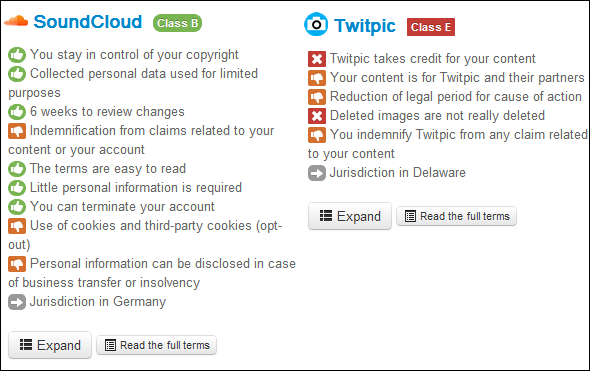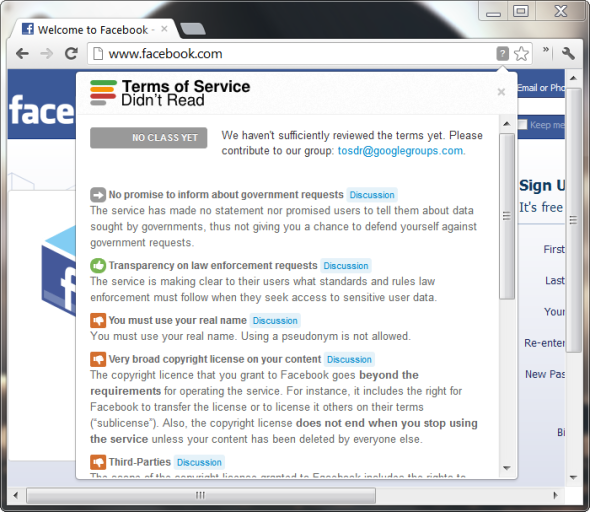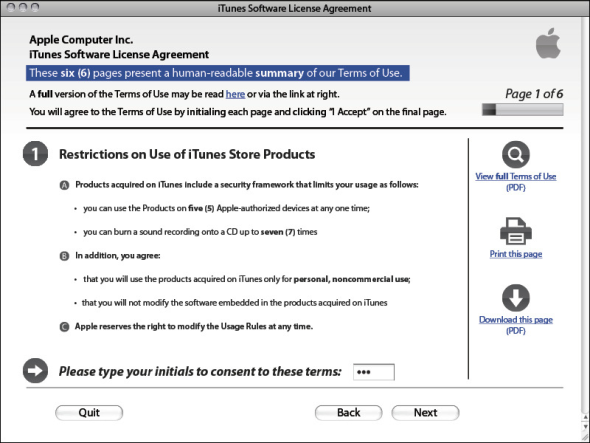Do you know how the online services you choose use your data? Do they claim a broad copyright to it, remove your rights to a class-action lawsuit in the USA, or share your information with other companies? Or are they a well-behaved service that respects your rights? The answer to this is in each website's terms of service - unfortunately, no one has the time to read those. A new service reads websites' terms of service for you, summarizing what you need to know in a quick, bullet-point list.
Let's be honest – no one reads every terms of service they come across, we all just say we did and click the Agree checkbox to get on with our busy lives. We've covered some of the more ridiculous things that can be found in EULAs and terms of services before – one company even offered $1,000 in the middle of their EULA to the first person that contacted them about the offer. It took four months for someone to notice – that's how few people read EULAs.
Why Not Just Read The Terms of Service?
If you think the solution is for everyone to read the terms of service, think again. A 2008 study by two researchers at Carnegie Melon found that the average web user came across around 1500 privacy policies a year. (Yes, every website you visit has its own privacy policy – these are similar to terms of service.)
The average privacy policy contains 2500 words -- at an average reading rate, it would take you about 25 days a year (24/7) to read all the privacy policies. If you took a more reasonable approach and made it your job to read privacy policies for 8 hours a day, it would take you 76 days a year to read those privacy policies.
Throw in the fact that most of these privacy policies likely say that they can change at any time and your task would be pointless. Worse yet, that was a 2008 study – it's likely that the average person encounters many more such documents today.
Terms of Service; Didn't Read
Terms of Service; Didn't Read is an innovative, smart solution to this problem. They read the terms of service for popular websites for you, condensing the terms into an easily understood bullet-point list. If that isn't enough, they rate websites according to their terms of service, so you can see at a glance if the website respects your rights or tramples on them.
Terms of Service; Didn't Read also offers browser extensions for Firefox, Chrome, and Safari. You can see information about a website's terms of service right from your browser, without navigating to any other pages.
Terms of Service; Didn't Read is still a new project, and it will hopefully grow and thrive – the web needs a project like this, if only to show websites that they need to make their terms of service easily understood or someone will do it for them.
Why Don't Companies Make This Easier?
If you're wondering how these websites can actually expect us to take 25 days a year (24/7) to read these contracts, the answer is that they don't. Terms of service are structured to make it impossible for the average person to even find the time to sit down and read them, much less understand them.
This explains how famously detail-oriented companies like Apple can release Windows software with a EULA saying that users can only run it on Apple computers – Apple wasn't paying attention to the EULA either.
There are some proposed solutions – Gregg Bernstein's "I agree to _____" proposes a radically redesigned and simplified approach to the iTunes software license agreement. This approach could be used for other software products and websites as well.
Some websites have improved a bit – Google recently merged 60 different privacy agreements into a single document. This is definitely an improvement, but it's nowhere near enough – very few people will actually read Google's privacy policy, even though it's been simplified.
You may also be interested in EULAlyzer, a free Windows program that automatically scans end-user license agreements for programs you install and alerts you to certain phrases in them.
How do you approach understanding the terms for the online services you use? Do you look up what other people are saying about the websites, or do you throw caution to the wind and ignore the terms of service entirely? Or are you the rare person that actually tries to read these documents? Leave a comment and let us know how you deal with this confusing mess!
Image Credit: Holding a Pen Ready to Sign a Contract via Shutterstock, Male Businessman Sitting Behind a Laptop via Shutterstock





